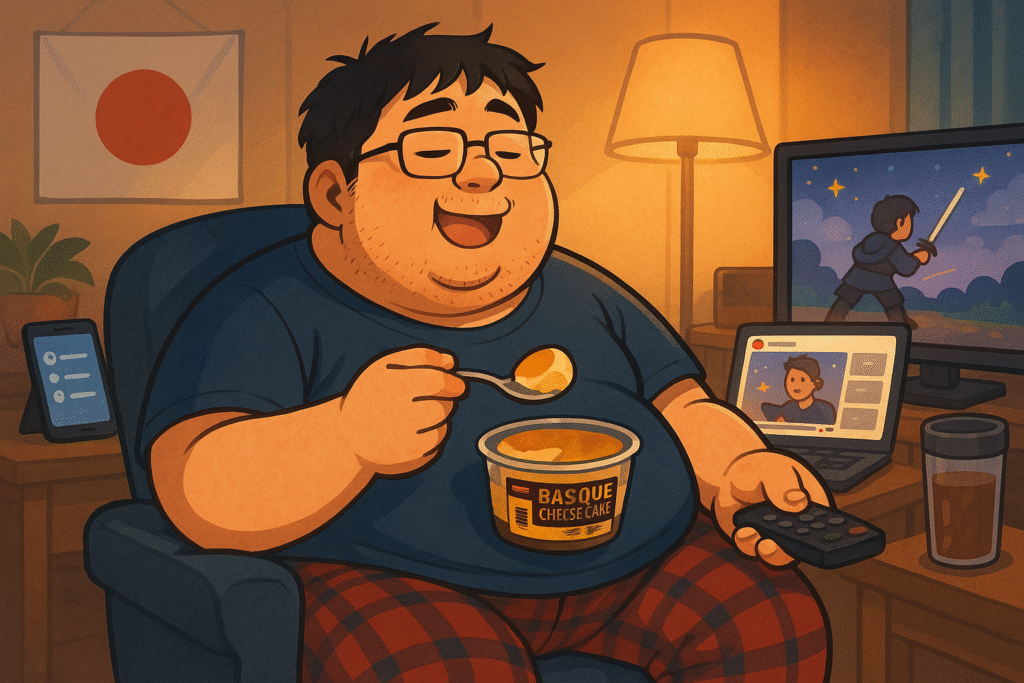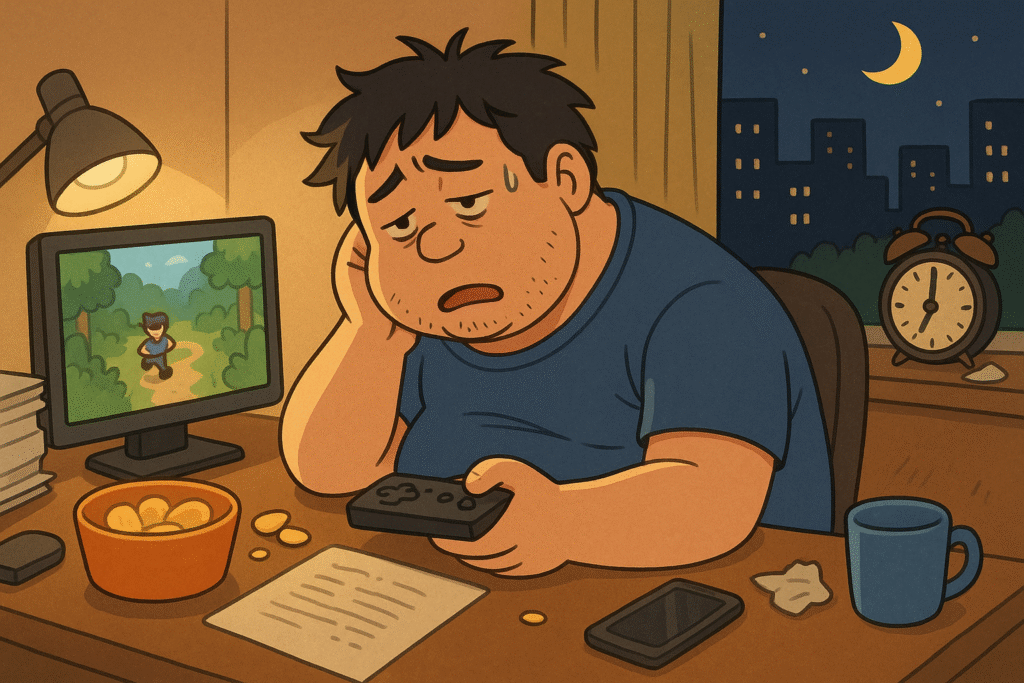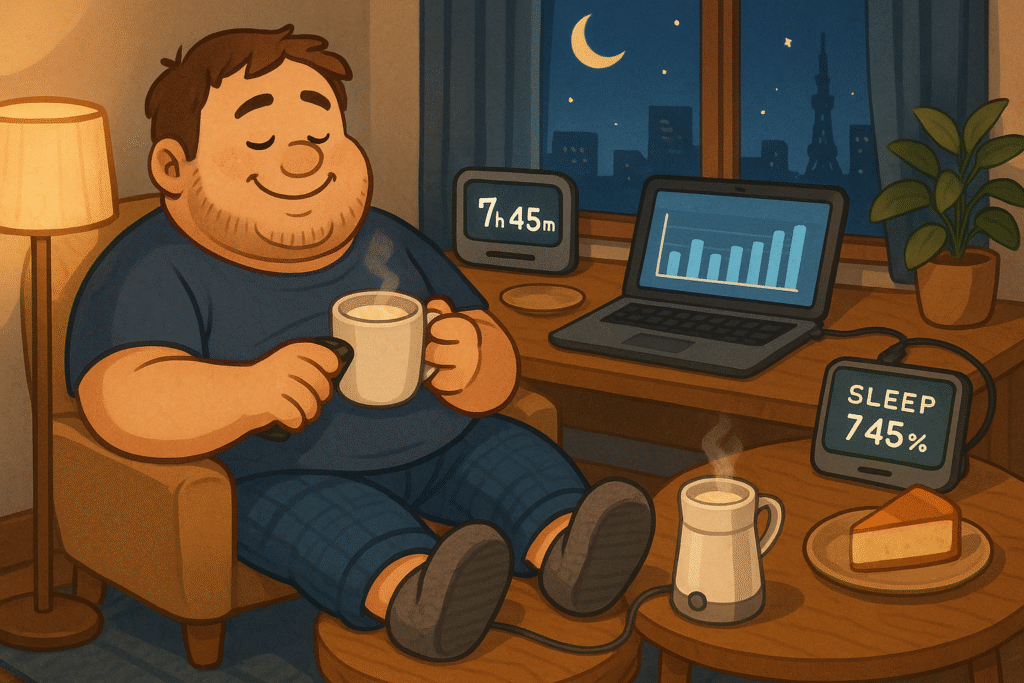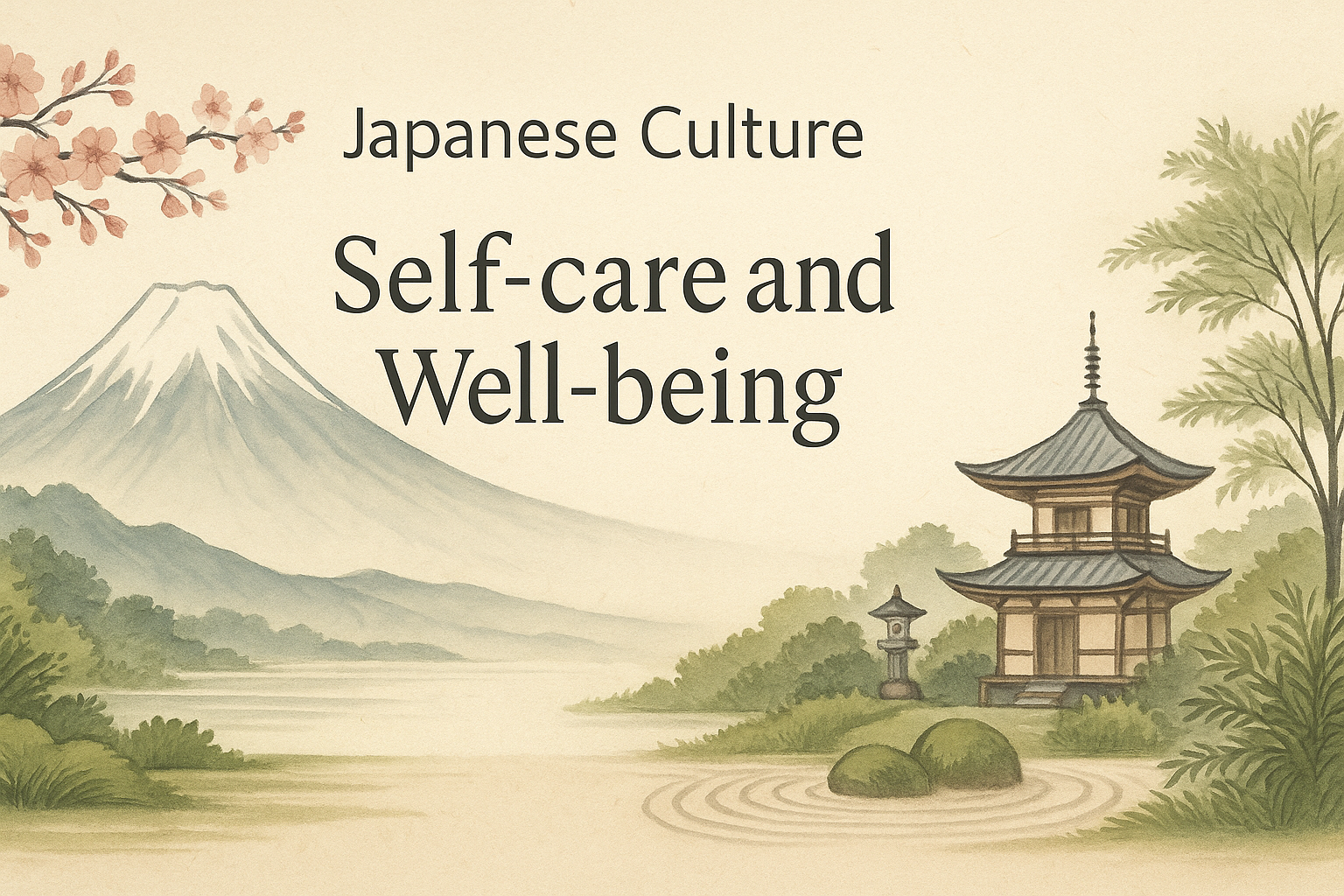In Japan, late-night rituals are more than habits — they reveal how individuals reclaim personal time after long, structured days. For visitors and residents alike, understanding this balance offers insight into Japanese life and how to create more mindful, restorative evenings. (Related article in Japanese)
Cultural Background – Why Late Nights Appeal in Japan
In Japan, late-night hours hold a special cultural significance.
During the day, Japanese life is shaped by structure and collective harmony—whether in the office, in school, or in public spaces. Personal freedom often takes a backseat to social obligations, formality, and the desire to maintain wa (harmony).
When night falls, this societal pressure fades.
For many, evenings offer rare moments to relax, indulge, and express individuality in ways that daytime norms restrict.
This has contributed to Japan’s unique late-night culture, where even simple routines—like enjoying a dessert, watching a favorite show, or relaxing in a quiet room—take on deep personal meaning.
Two strong currents reinforce this pattern:
- Otaku culture: Hobby enthusiasts often retreat into late-night hours to pursue passions such as gaming, anime, or online communities. It’s a time when they can immerse themselves without interruption or judgment.
- Work culture: Japan is also known for its intense work ethic.
Long hours, overtime (even unpaid “service overtime” or sabisu zangyo), and after-hours meetings remain common. For many, late-night hours are less about leisure and more about catching up on work, often at the expense of sleep.
In addition, compact living environments and the convenience of 24-hour services make it easy for these habits to flourish.
Japan’s ubiquitous convenience stores—bright, accessible, and well-stocked—support spontaneous late-night indulgences.

Current Situation – Late-Night Habits and Hidden Challenges
While these habits seem comforting, they often create unintended problems:
- Health risks:
Chronic fatigue, poor sleep quality, and lack of physical activity have become widespread issues. - Neglected daytime social life:
As evenings fill with personal rituals or extended work, opportunities for face-to-face daytime interaction decline.
Lunches with colleagues, spontaneous outings, and casual chats get replaced by online interactions. - Digital immersion and social anxiety (“komyusho”):
The term komyusho describes people who may communicate confidently online but struggle with real-world conversations.
The result is a negative cycle:
Poor daytime communication ➡️ reliance on online spaces ➡️ less confidence in social situations ➡️ more retreat into late-night digital life. - Reduced productivity:
Sacrificing sleep for entertainment or work inevitably impacts focus and performance the next day.
Surveys suggest that around 40% of Japanese working adults report insufficient sleep, often due to late-night habits.
These patterns affect not just individuals but workplaces and communities.

Why This Matters to Foreigners
For foreigners living in Japan—or even those simply fascinated by Japanese lifestyle—understanding this dynamic is crucial.
Late-night rituals reflect a delicate cultural balance:
relief from social demands, pursuit of personal comfort, and a creative response to the pressures of modern life.
But they come with risks that can quickly become familiar:
- Constant late-night entertainment
- Endless digital browsing
- Overworking due to “it’s normal here”
Awareness of this culture allows foreigners to enjoy its comforts without falling into its traps, adopting the good and avoiding unhealthy extremes.
A Story – Journey to Better Evenings
Let’s meet K-san, a thirty-something office worker in Tokyo and self-described “sweet-toothed otaku”.
By day, he appeared diligent and productive.
But every night followed a familiar script:
“Tonight I’ll go to bed early,” he would think… only for his personal ritual to begin the moment he returned home.
He’d quickly change into a favorite oversized T-shirt, dim the lights, and switch on a game stream on his TV.
His favorite treat—a rich Basque cheesecake from the nearby convenience store—was waiting.
This was his sanctuary, a reward for surviving another structured day.
At first, these evenings felt satisfying.
But soon, they stretched into hours of aimless browsing: scrolling Amazon reviews for anime figures, checking discount apps, hopping between fan forums.
He called it “my reward time,” but the next morning told a different story.
Heavy eyelids, stiff shoulders, a lack of focus in Zoom meetings—these became the norm.
His work shirts started to feel tight from weight gain.
Health checkups loomed on the calendar.
K-san realized his habits were draining his energy and self-esteem, yet they persisted.
The late-night hours that once felt indulgent now felt compulsory.
It was an uncomfortable paradox: a time meant for relaxation had become a hidden source of stress.
Everything changed when K-san stumbled upon a flyer at an electronics store:
“Why not improve the quality of your late-night lifestyle?”
This simple phrase sparked a shift in his thinking.
Instead of seeing late nights as a guilty indulgence, he could treat them as a time for mindful comfort.
Practical Tips – Tools That Help Solve Late-Night Challenges
K-san began experimenting with simple tools that didn’t force him to give up late nights but transformed them into moments that restored his mind and body—and prepared him for better days.

- Non-wearable Sleep Tracker
Non-wearable Sleep TrackerPlaced discreetly under his mattress, this device tracked sleep patterns automatically.
No wristbands, no charging.
Why it works:
It gave K-san valuable feedback that helped him adjust behaviors:
Limiting dessert after poor sleep, relaxing earlier, and celebrating good rest days with small rewards.
The result? His late-night habits became aligned with self-care, not self-sabotage. - Hot Milk Frother
K-san was disappointed by store-bought hot drinks—too sweet or not warm enough.
A small frother transformed his routine into a quiet, deliberate ritual.
Why it works:
It encouraged slower, mindful consumption, reduced mindless snacking, and turned late-night sweets into a peaceful ceremony. - USB Heated Slipper Foot Warmer
Evenings in Tokyo could feel chilly, and K-san often worked late at his desk.
The foot warmer added cozy comfort, with adjustable settings and an auto-off timer for safety.
Why it works:
By improving physical relaxation, it reduced stress headaches and made it easier for K-san to wind down and sleep soundly.
Conclusion – Why Quality Evenings Improve Quality Days
K-san’s story offers an important insight:
By making evening rituals intentional and comforting, you create not just a better night—but a better day to follow.
Foreigners in Japan, or anyone inspired by Japanese culture, can learn from this balance.
Late nights themselves may not be ideal, but Japan shows how even imperfect habits can be reimagined into mindful, high-quality experiences.
This leads to a deeper cultural understanding:
While working late or staying up to enjoy hobbies is not always healthy, it reflects a uniquely Japanese attitude:
accepting life’s pressures while finding beauty, care, and moderation in response.
By embracing this approach, foreigners can turn their own evenings into a time of calm, healing, and preparation—boosting well-being, productivity, and joy for the next day.


Comments